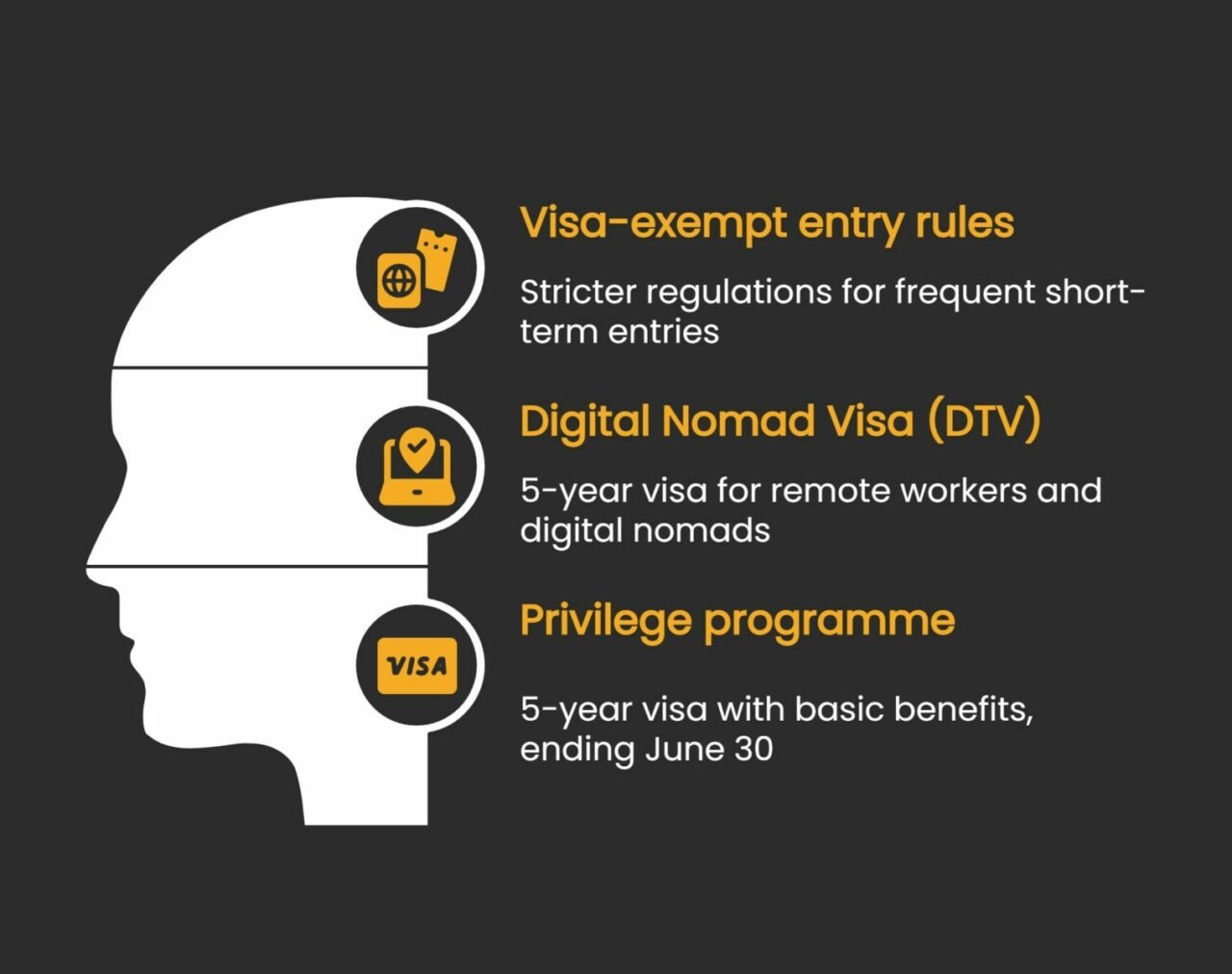Key visa and immigration changes in Thailand in 2025
What are the updates to the system that will help travellers enter Thailand this year

Thailand is updating its travel and immigration system this year to better serve global travellers, digital nomads, retirees, and investors. Key changes in the immigration system include the expansion of the Thai E-Visa system, the introduction of the Thailand Digital Arrival Card (TDAC), and new visa categories like the Destination Thailand Visa. These updates aim to simplify entry processes, improve security, and support economic growth, making it important for travellers to stay informed.
ดูโพสต์นี้บน Instagram
Key changes for visa and immigration in Thailand
| Jump to Section | Description |
|---|---|
| Visa exemption & extension options | Information on Thailand’s visa exemption policy, including the 60-day stay and extension options for tourists. |
| Immigration policy changes & long-term visa options | Details on the changes in immigration policy, including the introduction of the Digital Nomad Visa and stricter entry regulations. |
| Thailand Digital Arrival Card (TDAC) guide | A guide to the new TDAC system, explaining how to fill it out, what information is required, and its impact on immigration procedures. |
Visa exemption & extension options

Starting from July 15 last year, Thailand has expanded its visa exemption scheme to include nationals from 93 countries, allowing them to enter the country for tourism or short-term business without a visa and stay for up to 60 days. This change, aimed at boosting tourism and economic recovery after the Covid-19 pandemic, also allows visitors to apply for a 30-day extension at a local immigration office, giving them a maximum stay of 90 days.
The list of eligible countries includes major tourist sources like the United States, the United Kingdom, Canada, Japan, China, Germany, and many more from Europe, Asia, and the Americas. However, travellers entering through land borders can only use the exemption twice per calendar year.
Despite these benefits, the Thai government is reviewing the 60-day exemption due to concerns over abuse, including illegal work and overstays. The exemption period could be shortened to 30 days in the future to manage immigration better and protect the labour market. Travellers should stay informed about the latest regulations to ensure a smooth entry into Thailand.
| Visa Exemption & Extension |
|
| |
|
Immigration policy changes & long-term visa options

Thailand’s immigration policies in 2025 focus on stricter rules for frequent visa-exempt entries and encourage longer-term visa options. Travellers who attempt more than two visa-exempt entries within a year may be denied entry on their third attempt. This policy aims to reduce visa runs and encourage visitors to apply for long-term visas instead of repeatedly using short-term exemptions.
To support digital nomads, remote workers, and culture enthusiasts over the age of 20, Thailand introduced the 5-year Digital Nomad Visa (DTV). This multi-entry visa allows holders to live and work remotely in Thailand for up to five years, offering a legal and convenient alternative to short-term stays. The DTV is part of Thailand’s plan to attract skilled professionals and long-term residents who can contribute to the local economy.
Thailand also offers the Privilege Programme, which includes the affordable Bronze membership, a 5-year visa with basic benefits. However, this Bronze membership will no longer be available after June 30, so interested applicants should apply before the deadline.
These changes show Thailand’s effort to manage tourism growth and immigration while providing flexible options for long-term stays. Travellers and potential long-term residents should keep up with updates to ensure they comply with the latest rules.
| Immigration Policy & Long-Term Visas |
|
| |
|
Thailand Digital Arrival Card (TDAC) guide

Since May 1 of this year, all travellers entering Thailand, whether for tourism, business, or long-term stays, must complete the Thailand Digital Arrival Card (TDAC) online before arriving. This new system replaces the old paper arrival card (TM6) and is part of Thailand’s efforts to make immigration procedures faster and more efficient.
Travellers need to submit their TDAC up to 72 hours before their arrival, providing details like passport information, travel plans, accommodation address, and a basic health declaration. The form now includes a section for long-term residents, making it easier for them to complete.
If travellers forget to fill out the TDAC before arriving, kiosks will be available at major airports to fill it out on-site. However, submitting it early is recommended to avoid delays. When filling in the accommodation section, travellers should list their first place of stay, which can be updated later if plans change.
Once submitted, travellers will receive a QR code to present at immigration, making the entry process quicker. Thai citizens do not need to complete this form; it only applies to foreign nationals arriving by air, land, or sea.
If you are looking for a reliable agency for an early submission service to enter Thailand, fill out the form here! Please note, this is not the official government portal but this private service helps you submit ahead of the standard 72-hour window and offers a smoother, faster entry process.
| Thailand Digital Arrival Card (TDAC) |
|
| |
|
Thailand is changing its travel and immigration system in 2025 to improve the experience for global travellers, digital nomads, retirees, and investors. The key changes include expanding the E-Visa system, introducing the Thailand Digital Arrival Card (TDAC), and offering new visa options like the Destination Thailand Visa. Starting from July of last year, visitors from 93 countries can stay in Thailand for up to 60 days without a visa, with the option to extend their stay up to 90 days.
Thailand is also encouraging long-term visas, like the 5-year Digital Nomad Visa (DTV), while making it harder for people to repeatedly use short-term visa exemptions. This information is sourced from the Baan Thai Immigration Solutions and these tips should help.
The TDAC will replace the old arrival card in May of this year, requiring travellers to submit their details online before arrival for faster processing. It’s important to stay informed about these changes if you plan to travel or live in Thailand. For more on the E-Visa system, check out this article: Everything You Need to Know About E-Visa in Thailand.
Latest Thailand News
Follow The Thaiger on Google News:


























